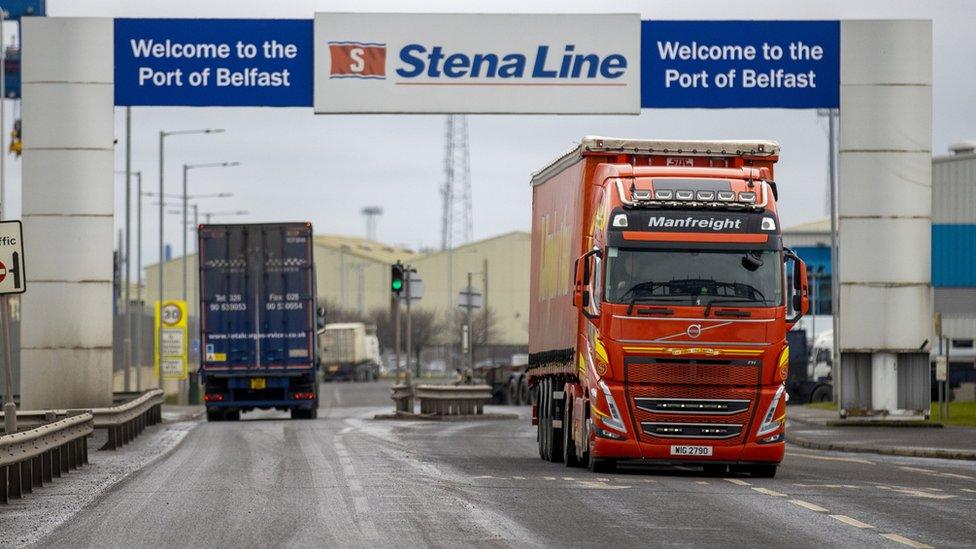Brexit: What does Windsor Framework mean for business?
- Published
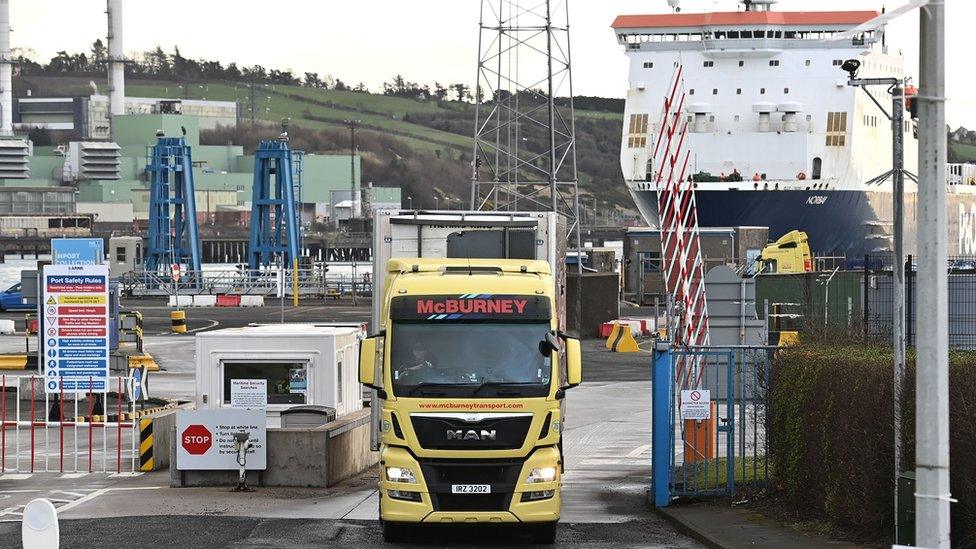
Checks on goods at Northern Ireland ports will be reduced under the new deal
The UK government has reached agreement with the EU on major changes to the Northern Ireland Protocol.
The protocol is the part of the Brexit deal which sets Northern Ireland's trade rules.
It keeps Northern Ireland inside the EU's single market for goods.
That keeps the Irish land border open but means products arriving into Northern Ireland from the rest of the UK are subject to checks and controls.
The new deal should reduce the frictions on Great Britain-to-Northern Ireland trade - so what are the major changes?
Green lanes and red lanes
At the heart of this deal is the concept of green lanes and red lanes.
British goods which are staying in Northern Ireland will use the green lane at Northern Ireland ports, meaning they face minimal paperwork and no routine physical checks.
Goods which are due to travel into Ireland will use the red lane, meaning they face customs processes and other checks at Northern Ireland ports.
To use the green lane businesses will need to register as a trusted trader under the new United Kingdom Internal Market Scheme (UKIMS).
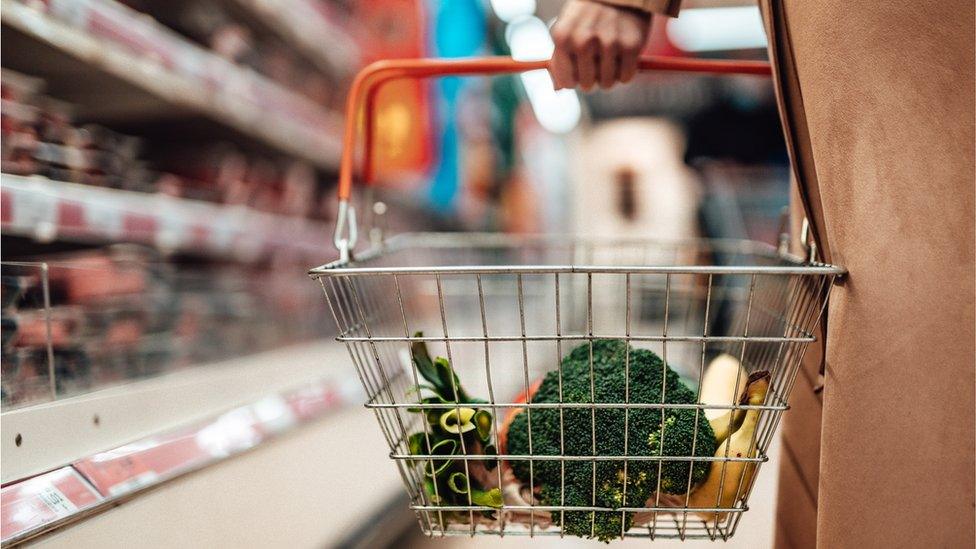
M&S chairman Archie Norman says the new deal will improve the availability of produce in Northern Ireland
Supermarkets and other large businesses that are members of an existing scheme will be automatically moved onto UKIMS.
A wider range of business will also qualify for UKIMS, including those based in Great Britain and which have no physical premises in Northern Ireland.
For most businesses in Northern Ireland the physical checking of goods has not been the major impact of the protocol - it has been the added bureaucracy.
The government says the new deal addresses that.
For example businesses moving goods through the green lane will no longer have to provide a "supplementary declaration" - a detailed form which must be completed after goods have arrived from Great Britain.
The government also appears to have committed to retaining the Trader Support Service, which helps businesses with their trade paperwork.
Sarah Hards, from local haulage company AM Logistics, based in Larne Harbour, said the Windsor Framework was further reaching than expected.
"What has come across is actually more beneficial than previously thought... it almost takes us back to pre-Brexit times," she told BBC's Good Morning Ulster.
Ms Hards said the prospect of reduced supplementary declarations and signposted goods lanes would create "a better situation than what we're currently in".
An end to the sausage war
The EU has strict rules and processes for food products entering its single market.
That means the trade in food products from Great Britain to Northern Ireland has seen some significant impacts, particularly for smaller businesses.
Under the original terms of the protocol some Great Britain products which the EU deems higher risk, such as fresh sausages, should have been banned from Northern Ireland.
Now the prospect of a ban has gone for good.
That is because the new agreement means UK public health and safety standards will apply for all retail food and drink in the UK internal market.
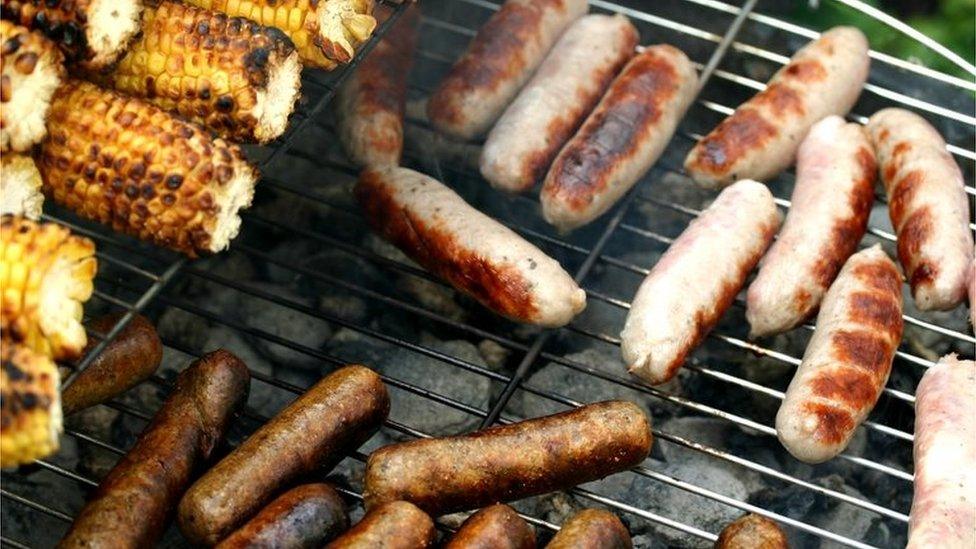
A proposed ban on fresh sausages from Great Britain entering Northern Ireland was one consequence of the protocol
The government says it removes more than 60 EU food and drink rules that were in the original protocol.
Traders moving food by using the green lane will only need to complete a single certificate for each lorry movement rather than multiple certificates for each load.
Identity checks - a visual inspection of the seals on lorry trailers - will be phased down from 100% today to just 5% by 2025.
Physical checks on green lane loads will no longer be routine and only be carried out when it is suspected the system is being abused.
The flipside of this is the introduction of "Not for EU" labels on food products sold in Northern Ireland.
From October this year prepacked meat and fresh milk have to be individually labelled in that way, with labelling of other goods being rolled out by July 2025.
The government says it will provide financial support to help businesses with the labelling change.
Marks & Spencer chairman Archie Norman has been one of the retail sector's most persistent critics of the Northern Ireland Protocol.
He describes the new agreement as a "big step forward", saying it will reduce "burdensome" checks and controls and improve the availability of produce.
Further movement on medicines
Last year the EU acknowledged that the protocol, as originally agreed, would cause too much disruption to the supply of medicines to Northern Ireland.
It changed some of its laws in an attempt to guarantee the supply of medicines from Great Britain to Northern Ireland.
But last week a House of Lords committee warned there were still some outstanding problems.
The two major issues raised by the pharmaceutical industry appear to have been addressed.
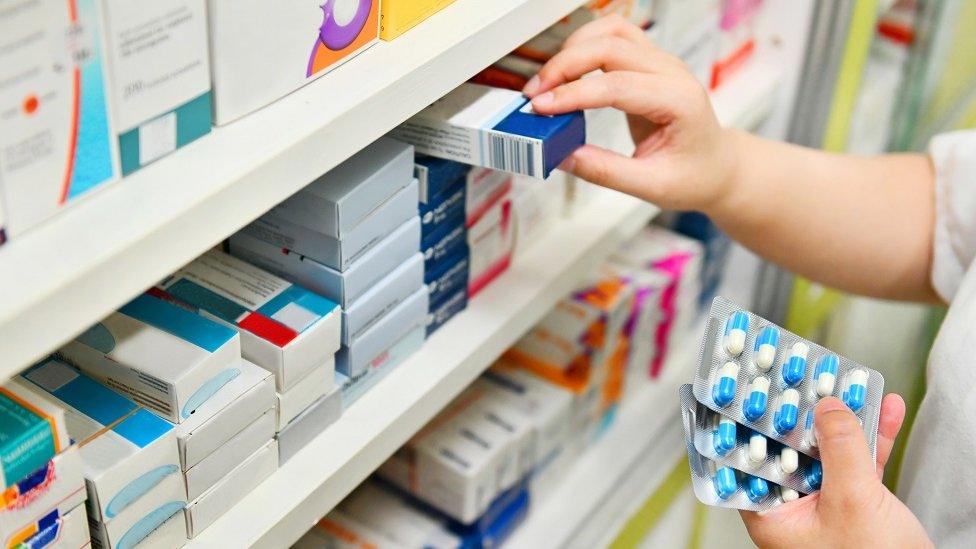
One major pharmaceutical body says the agreement provides a "permanent solution" to medicine supply problems
Businesses will be able to produce a single medicines pack for the whole of the UK, including Northern Ireland.
That may sound trivial but there were warnings that having to produce a specific pack for a market as small as Northern Ireland would be commercially unviable.
Secondly the EU's Falsified Medicines Directive will be disapplied for medicines being supplied to Northern Ireland.
The Association of the British Pharmaceutical Industry says the agreement "appears to bring a return to a single UK market for medicines, providing the permanent solution that our members have been calling for".
Online shopping
Under the original protocol all parcels being sent from Great Britain businesses to Northern Ireland consumers would have required a customs declaration.
As most online shopping in Northern Ireland is fulfilled from Great Britain warehouses that could have had a major impact.
Even though a "grace period" meant that part of the protocol was never implemented some suppliers in Great Britain gave up on Northern Ireland regardless.
The new deal effectively makes this grace period permanent though there will be some requirements for logistics companies.
Authorised parcel operators will have to share data with the government to monitor and manage any risks of smuggling into the EU market.
That data-sharing process should be in place by September 2024.
Return of the Scottish seed potato
The horticulture industry has felt significant effects from the protocol.
There were new requirements for inspection and certification of plants being moved from Great Britain to Northern Ireland.
Some products, such as seed potatoes have been entirely banned.
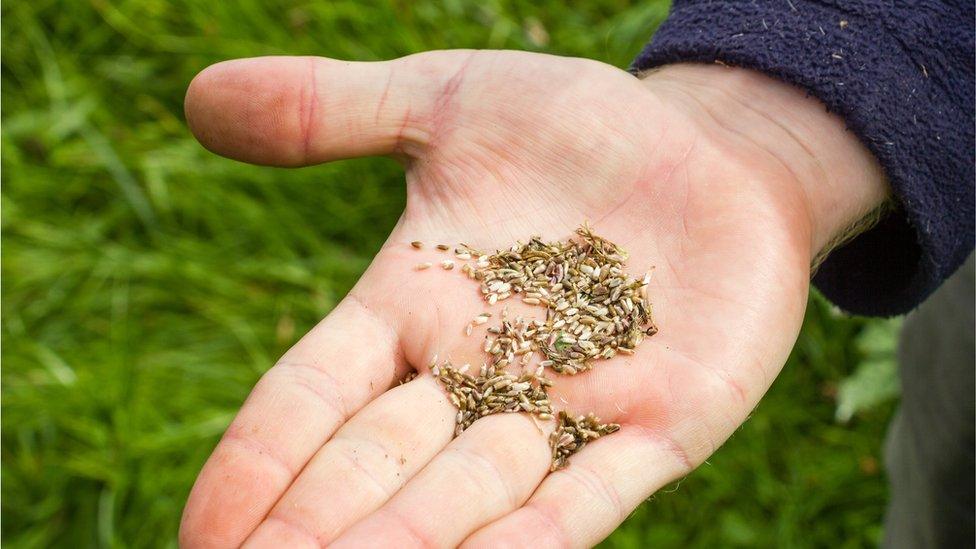
The agriculture and horticulture sectors wanted the EU to relax rules on importing agriculture seeds to Northern Ireland
Now instead of full EU certification, all plants and seeds will move under the existing UK-wide plant passport scheme, in line with traders throughout the UK.
That is something garden centres have been calling for, pointing out that the plant passport scheme provides full traceability.
The seed potato ban will be revoked this autumn, as will a similar ban on so-called "high risk" trees and shrubs.
The Horticulture Trades Association says the deal means "real trade can resume again" for its members in Northern Ireland and Great Britain.
"We are pleased that common sense has prevailed in this agreement and much of what we have asked for has been listened to," it added.
VAT and alcohol duties
Under the original protocol, EU rules for VAT and excise apply to goods in Northern Ireland.
That has meant that certain UK tax changes which are not compatible with EU rules cannot be introduced in Northern Ireland.
The new deal allows Northern Ireland to diverge from EU rules on the structure of excise duties, meaning that a new UK plan which is focused on taxing beverages based on their alcoholic strength can apply in Northern Ireland.
The deal on VAT means the UK can apply reduced VAT rates on goods supplied and installed in immovable property (for example, a heat pump or solar panels for a house) located in Northern Ireland, even if the applicable UK VAT is below EU minimum rates.
The UK can also apply reduced VAT rates to a higher number of categories of goods than allowed under EU law.
Related topics
- Published2 February 2024

- Published28 February 2023
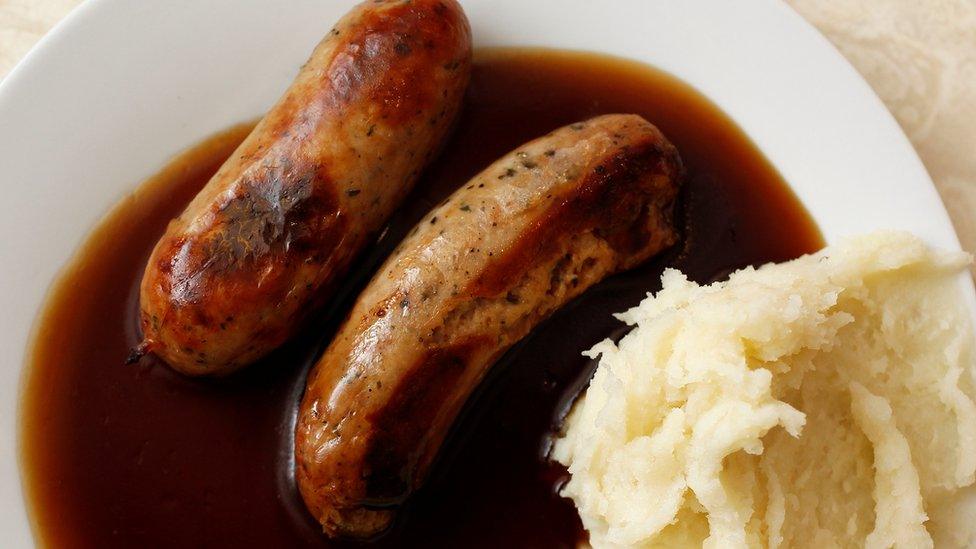
- Published27 February 2023
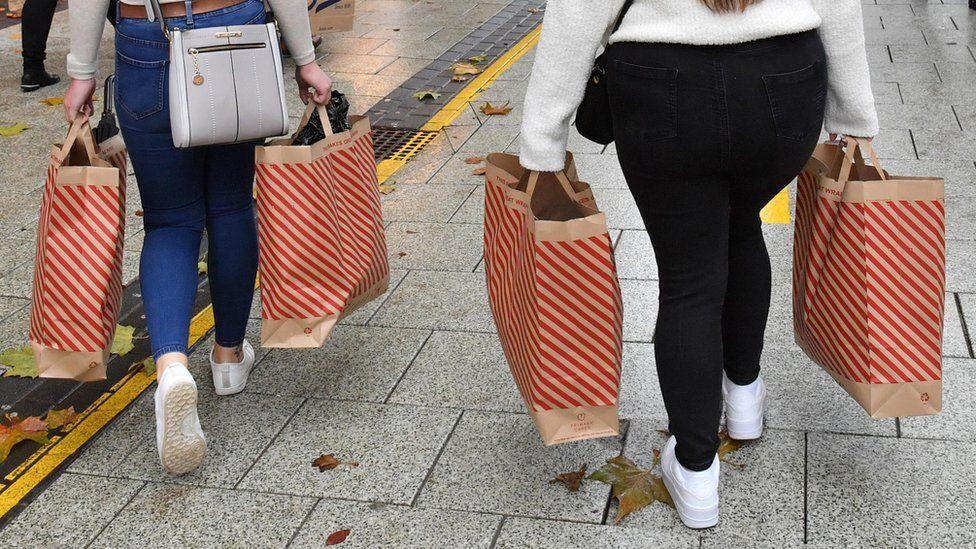
- Published27 February 2023
